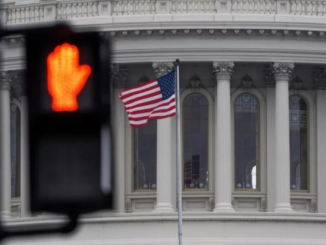
Salvadoran prison guards escort alleged members of the Venezuelan gang Tren de Aragua and the MS-13 gang recently deported by the U.S. government to be imprisoned in the Terrorism Confinement Center (CECOT) prison, in Tecoluca, El Salvador April 12, 2025. Secretaria de Prensa de la… Purchase Licensing Rights
| Published April 16, 2025
In a significant legal development, U.S. District Judge James Boasberg has determined that officials from former President Donald Trump’s administration may face criminal contempt charges for defying a court order that halted the deportation of Venezuelan migrants. The judge’s ruling centers on the administration’s invocation of the Alien Enemies Act to deport alleged members of the Venezuelan gang Tren de Aragua, despite a judicial injunction.
Judge Boasberg had issued an order on March 15, 2025, prohibiting the deportation of these individuals. However, the administration proceeded with the removal, asserting that the court lacked authority over executive actions concerning foreign affairs. The judge criticized this stance, emphasizing that the administration’s actions represented a “willful disregard” of the court’s directive.
The court has offered the administration an opportunity to “purge” the contempt by facilitating legal avenues for the deported individuals to challenge their removal. This does not necessitate their physical return to the U.S., but rather the provision of mechanisms to ensure their legal rights are upheld.
This case underscores the ongoing tensions between the judiciary and executive branches over immigration enforcement and the limits of presidential authority. Legal experts view the administration’s actions as a significant challenge to the constitutional balance of powers.
As the situation evolves, the court’s insistence on adherence to legal processes reaffirms the judiciary’s role in overseeing executive actions, particularly those with profound implications for individuals’ rights and international relations.
Did the Trump Administration disregarded the Court‘s directive?
The Trump administration’s actions may not be seen as “disregarding” the court’s directive, but rather as upholding its constitutional duty to protect national security and enforce immigration laws, even in the face of judicial overreach.
Key Arguments:
1. National Security Comes First
The individuals in question were alleged members of Tren de Aragua, a violent Venezuelan gang. Conservatives argue that deporting known or suspected criminals is a legitimate and necessary act to protect American citizens, regardless of court orders that may interfere with executive enforcement powers.
2. Executive Authority on Immigration
From the conservative perspective, the Alien Enemies Act gives the executive branch broad discretion over deportations involving foreign nationals—especially from regimes hostile to the U.S. The Trump team may have viewed the court’s injunction as an inappropriate judicial encroachment into foreign policy and national defense matters.
3. Standing Up to Judicial Activism
Many conservatives see the judiciary as increasingly activist, issuing injunctions that hamstring lawful executive action. In this view, the Trump administration’s decision to proceed wasn’t about flouting the law—but about pushing back against a judiciary that overstepped its bounds.
4. Legal Pathways Remain Intact
Even with deportations carried out, the administration complied with the spirit of due process by allowing those deported to challenge their removals via legal channels. Conservatives argue this shows the administration wasn’t acting in bad faith—it was balancing enforcement with legal accountability.





Be the first to comment